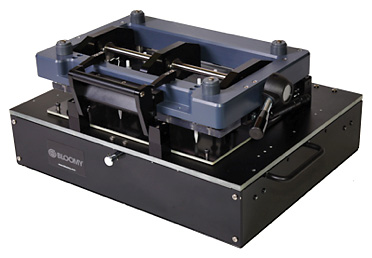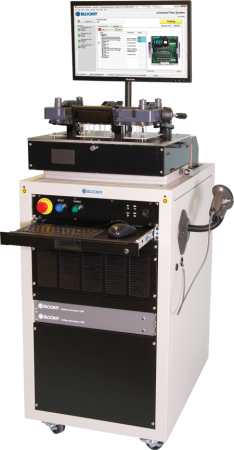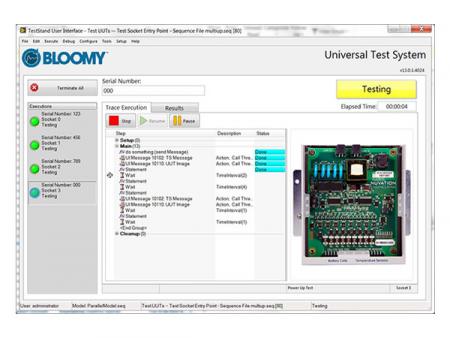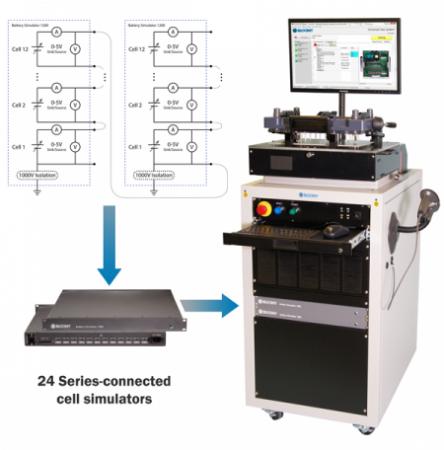Ensures functionality before assembly
The Battery Management System (BMS) Manufacturing Test System performs functional testing of product during end-of-line manufacturing. The system hardware includes all instrumentation to test a BMS, including multiple cell simulators, a mass interconnect for quick product transition and bed-of-nail fixtures to ensure less down time, higher throughput, and easy maintenance. The system application easily integrates into manufacturing processes, provides a method to test multiple product types, and optimizes tests to ensure only good product is released from manufacturing.
- Hardware configuration for BMS master and module testing
- Instrumentation to simulate
- Pack and/or cell voltages
- Temperature and current sensors
- Control IO such as contactors and fans
- Communications and more
- Fault insertion and auxiliary system measurements
EFT Module for TestStand software based on NI TestStand and LabVIEW
Built on the Bloomy UTS platform, the BMS Manufacturing Test System provides battery manufacturers functional test capabilities of BMS master controllers and modules before assembly. Proper end-of-line testing includes verifying BMS functions such as:
- Battery pack and cell monitoring
- Overvoltage and undervoltage protection
- Cell balancing
- Inrush current switching
- Non-volatile memory storage
- Temperature control monitoring
- System communications such as CAN, modbus, or UART
- State of charge, state of health, and other performance metrics
- Safety interlocks and fault condition recognition
The BMS Manufacturing Test system is a modular design that includes all necessary instrumentation and manufacturing necessities such as an uninterruptable power supply (UPS), barcode scanner, traveler printing, and safety integration. A robust Virginia Panel mass interconnect provides a method for interchangeable fixtures to connect to the instrumentation to test a wide range of BMS models.
Trying to validate a BMS?
The BMS Manufacturing Test System is critical in the assembly and manufacturing of batteries. Ensure BMS functionality through these system benefits:
- Architected for manufacturing integration and ease of use
- Modular design with interchangeable fixtures to test multiple products
- User-friendly software for customizing test specifications and logging results
- Simulation of complete BMS IO and communication for packs or modules
- Customize tests for evaluating BMS functionality, health, and performance
The following specifications are standard. Systems can be customized to accommodate your requirements.
| Cell Channel Simulation | |
|---|---|
| Number of Channels | 12 / module |
| Max number of Modules | 20 (240 channels @ 4.2V) |
| Channel Type | Sink and Source |
| Voltage Range per cell | 0.0 to 5.0 V |
| Voltage Resolution | 0.1 mV |
| Voltage Accuracy (Requires Remote Sense) | ±3 mV |
| Current Range* | ±500.0 mA; output derates linearly under 2 V |
| Current Resolution | 0.1 mA |
| Current Accuracy | ±4 mA |
| Current Limiting Accuracy | ±10 mA |
| Common mode isolation* | 1000 VDC |
| Cell Channel Readback | |
|---|---|
| Voltage Resolution | 0.1 mV |
| Voltage Accuracy | ±3 mV |
| Current Resolution | 0.1 mA |
| Current Accuracy | ±4 mA |
Higher accuracies can be achieved with a custom relay matrix and an integrated 7.5 digit DMM. | |
| Temperature Sensor Simulation | |
|---|---|
| Typical Signal Type* | Voltage Resistance |
| Number of Channels | 4 to 64 |
| Range | ±10V 2.5Ω – 1.5MΩ |
| Resolution | <1 mV 2Ω |
| Accuracy (typical) | 0.03% 0.2% |
| Current Sensor Simulation | |
|---|---|
| Typical Signal Type | Analog voltage |
| Number of Channels | 2 channel |
| Range | ±10V |
| Resolution | 16 bit |
| Accuracy | ±0.5% |
| Additional Signal Types | CAN communications |
| BMS Bus Voltage Simulation | |
|---|---|
| Number of Channels | 2 channel |
| Voltage Range* | 0 to 60V |
| Current Range* | 0 to 20A |
| Power Range | 850W |
| Communication Protocols | |
|---|---|
| Standard Protocol | High-speed CAN |
| Number of Ports | 2 |
| Baud Rate | 40 kbits/s to 1Mbit/s |
| Additional Protocols* | LIN, SPI, RS232, Modbus |
| Pack Voltage Simulation | |
|---|---|
| Number of Channels | 1 to 10 |
| Voltage Range* | Up to 1000 VDC |
| Output Power | 5W 30W 1500W |
| Resolution | 0.1V 0.1V 0.003V |
| Accuracy (typical) | 1-2% 1-2% 0.075% |
| BMS Control IO | |
|---|---|
| Number of Channels | Up to 32 input / 32 ouput |
| Voltage Range | 0 to 30V |
| Current Drive | Up to 150 mA |
| Common Mode Isolation | 30V bank-to-bank |
| Fault Insertion | |
|---|---|
| Number of Channels | 24 |
| Type | Relays |
| Voltage Range | 0 to 500V |
| Auxiliary Measurements | |
|---|---|
| Number of Channels | 32 |
| Type | 7.5 Digit DMM (voltage, current, resistance) |
| Voltage | ±10 nV to 1000 VDC |
| Current | 8 DC current ranges with sensitivity down to 1 pA |
| Resistance | 10 µΩ to 5 GΩ |
| Common mode isolation | ±500 VDC/Vrms |
* Do you have special requirements for cell, bus, or pack voltage or current; isolation, temperature simulation, or communications? Contact us.
The EFT Module for TestStand is a test management software environment based on NI TestStand and LabVIEW that is optimized for manufacturing test. The software performs fixture and product identification, barcode scanning, BMS communications, BMS firmware loading, calibration of BMS cell monitors, test instrument control, test sequence optimization, and minimizes operator interaction. Test reports can be printed, provided as travelers, or integrated into a manufacturing database. Because all BMS units are unique, Bloomy has developed system-level components to facilitate platform scalability and supportability to reduce software customization. Major application features:
- Operator User Interface: a standardized user interface for manufacturing test is provided. It has been optimized to guide an operator through product testing.
- Automated Test: fully automated test environment, providing the ability to generate single point value test sequences to implement functional testing, and generate test reports.
- Communication Integration: integrate standard CAN and LIN automotive diagnostics or implement custom communication protocols used for measurement and reporting.
- Reporting: create test reports for each unit under test. Reports can be printed, provided as travelers, or integrated into a manufacturing database.
- System Configuration: store all necessary hardware configuration information, product fixture IDs, software variables, IP address, report folders, test sequences, and other critical station information.
The BMS Manufacturing Test System integrates a Virginia Panel G12 mass interconnect, providing a robust, reliable interface for test fixtures. Bloomy’s expertise in fixture design ensures your BMS has the correct test coverage for a complete test plan. The fixture components are meant for thousands of connections for volume testing during manufacturing. Custom bed-of-nails or cabled fixtures are available. Learn more about Bloomy UTS Fixtures.




